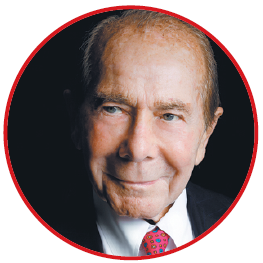
May 4, 1925, in New York
EDUCATION
BA, pre-law certificate, University of Miami
Law degree, New York Law School
CAREER
1952-60: Continental Casualty Company
1960: Vice-president, C.V. Starr & Co
1967: Chairman and CEO, AIG
1988-95: Director, Federal Reserve Bank of New York
1990: Chairman, International Business Leaders' Advisory Council for the mayor of Shanghai
1994: Senior Economic Advisor, Beijing Municipal Government
1994-95: Chairman, Federal Reserve Bank of New York
2005-present: Chairman and CEO, Starr Companies
After a century, looking at a Starr in the making
Dual goals
In 1992, Starr Companies received a wholly owned life insurance license in China, which helped further opening up of China's financial services industry to US businesses. The company introduced the insurance agency system to the country, and helped people learn about sales and performance-based commissions.
"Even before we got the license, we helped PICC and other Chinese insurance companies learn more about life insurance," Greenberg said. "We take them (their people) outside of China to train them and show them how to work in another country. They benefited from that, obviously.
"On the more complex parts of insurance business is nonlife insurance. Construction risks, marine risks, aviation risks are much more complex. They are learning, but it takes more time, and we are helping them."
Greenberg said it was "with difficulty" that Starr Companies has achieved its dual goals of ensuring rapid development and helping Chinese companies grow in the past 40 years.
"We have strong people all through Asia. We bring them to China to help train Chinese people. We bring Chinese people and train them here. We do it all ways."
After joining C.V. Starr & Co, Greenberg helped consolidate a number of insurers and insurance agencies that Starr owned with others that he had appointments and/or joint ventures into American International Group, or AIG, in 1967. He was named president and CEO of AIG the same year.
He took AIG public in 1969, and its market value increased from about $300 million that year to more than $180 billion in 2004, when it was the largest consolidated insurance and financial services holding company in the history of the world.
When he retired from AIG in 2005, Greenberg focused on his role as chairman and CEO of Starr Companies, which includes C.V. Starr & Co and Starr International Co. At the time, it was the largest shareholder of AIG.
Starting with only a handful of employees, over the next 13 years, Greenberg expanded Starr Companies' global operations to nearly 4,000 workers at offices in 20 countries.
"It took a lot of courage for an American with little money to go to China and start an insurance business," he said, referring to Starr, in an interview with Leaders magazine. "And we're carrying on that tradition.
"We're proud that we're celebrating 100 years of being in business under the name Starr. I'm proud to have known Mr Starr, and proud of what he accomplished."
Speaking to China Daily, the chairman and CEO said Chinese companies have improved a lot, but "they have to learn how to do business outside of China, which is very difficult."
"As the country develops more, they have to keep pace with the country. So you have to train more people. It takes experience. They are learning it all the time. ... We are helping them as much as we can," he said.
It takes patience to become competitive, he added. "There's no shortcut. You have to learn. We bring them to the country, we have our own operation. We teach them how. But it takes time. You can't do that in one week."
He said he sees Chinese companies as more than just competitors. In large risks, no single company takes on the entire risk. "We share risks. We teach them how to do it. We get them some business. So it's paid for that way," he said.
China became the world's second-largest life insurance market last year and is expected to become the world's largest by 2028, Xinhua News Agency reported, citing an April statement by Allianz, a leading insurer in Europe.
The US, with more than 30 percent of global premium income, at $1.33 trillion, is the world's largest insurance market, but Allianz said in a report it will lose the No 1 spot to China in the next decade.


